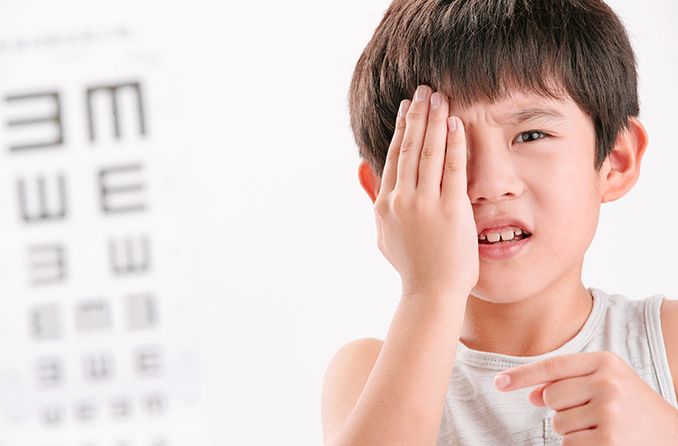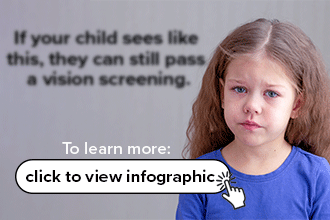Are school vision screenings enough to evaluate my child’s vision?

Vision screenings given at school are useful tools to identify certain vision problems that a child might have. However, vision screenings are not a substitute for an eye exam. A full comprehensive eye exam is needed to correctly diagnose any impairments or conditions and provide treatment.
Vision screenings are beneficial for kids’ vision
School nurses (and trained personnel) conduct vision screenings for children as a quick way to make sure they are seeing things correctly. The practice is beneficial because each child receives individual attention for their vision.
Some children may not even know that they have trouble seeing until they are screened for it. So, being able to identify that vision problems may exist is especially helpful. This is particularly true as the rates of conditions like myopia (nearsightedness) are on the rise.
Currently, myopia is the most common vision problem in children 5 years and older. What’s more: 1 in 4 school-aged children has an undetected and untreated vision problem that interferes with learning.
And a screening can provide the first steps in discovering such an issue. Not to mention school vision screenings are free of charge.
… but they’re not a substitute for eye exams
Vision screenings are useful. But if one reveals that something is wrong with a child’s vision, an eye care professional needs to step in for further evaluation.
Why?
Vision screenings are limited to simply identifying vision problems. They can show if a child is having trouble seeing things near or far. They may also help identify if a child has difficulty holding their eyes steady while they look at different objects. But they can’t tell the degree of these problems or offer any corrective measures.
A comprehensive eye exam is the best way to make sure your child’s vision is healthy, clear and comfortable. These exams are performed by eye doctors, who have greater knowledge of eye problems and how to address them.
Comprehensive eye exams are also important because they provide information about the following:
Eye diseases and other conditions
Vision screenings lack much of this information. In fact, research shows that up to 75% of eye problems are overlooked in screenings.
Schedule a comprehensive eye exam for your child
Even if your child passes a vision screening at school, it’s critical that they have a comprehensive eye exam once a year or every two years. Ask your eye doctor what they recommend.
Bonus: If your child does need eyeglasses, your eye care professional can help them pick out the perfect pair at their appointment! They may even recommend a therapeutic approach. This could include overnight contact lenses or pharmaceutical eye drops to help slow or even correct myopia (if that is their diagnosis).
Keep in mind that vision continues to develop throughout childhood, and it’s important to monitor these changes. That goes both for visual acuity (sharpness of vision) and any risks of other vision problems.
If you have questions or concerns about your child’s vision, never hesitate to contact your eye doctor.
READ MORE: Eye exams: 5 reasons they are important
Comprehensive eye exams vs. vision screenings: What's the difference? Texas Children’s Hospital. Accessed November 2021.
Eye screening for children. American Academy of Ophthalmology. March 2021.
Vision screening guidelines by age. National Center for Children’s Vision and Eye Health, Prevent Blindness. Accessed January 2022.
With childhood myopia rates on the rise, the American Optometric Association highlights the importance of early intervention through annual eye exams. American Optometric Association. March 2019.
Page published on Wednesday, March 23, 2022
Medically reviewed on Sunday, February 20, 2022







